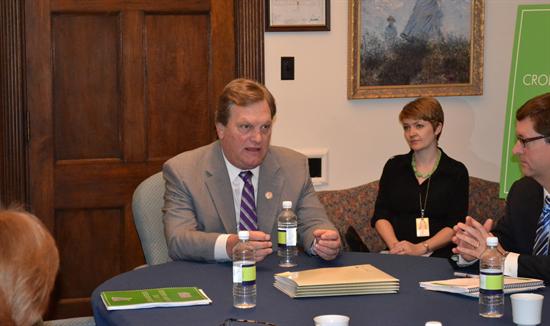
The primary obstacle to opening Yucca Mountain in Nevada as a nuclear waste-disposal site could be Senate Majority Leader Mitch McConnell (R-Ky.), the House’s top Energy Department appropriator said Thursday.
“[I]n the Senate they have a two-vote Republican majority,” Rep. Mike Simpson (R-Idaho) said during the Energy Department-sponsored National Cleanup Workshop in Alexandria, Va. “One of those seats is in Nevada, and I’m not sure Mitch McConnell wants to risk that seat by pursuing Yucca Mountain.”
Simpson was referring to Sen. Dean Heller (R-Nev.), the de-facto leader of the Nevada resistance to Yucca Mountain now that former Sen. Harry Reid (D-Nev.) has retired. Heller is up for re-election in 2018 and generally regarded as a vulnerable incumbent. McConnell has signaled support for Heller’s re-election bid next year, but the majority leader also needs Heller to be a dependable vote for crucial GOP legislative issues, such as tax and immigration reform, now.
To secure Heller’s vote, McConnell may be willing, for the time being, to sacrifice Yucca Mountain, Simpson said.
“[W]hether he [McConnell] will allow the Senate Committee to put money into Yucca Mountain, I don’t know,” Simpson said.
Spokespersons for McConnell and Heller did not reply to requests for comment.
Though not yet uttered so publicly by an elected official with such influence over DOE’s annual budget, suppositions such as Simpson’s have been a staple of nuclear-industry gossip in Washington since before President Donald Trump was sworn into office in January.
It took until March for Trump to officially signal his intention to revive the Yucca Mountain license application then-President Barack Obama effectively canceled in 2010, then until May before the administration formally requested $150 million toward this goal in fiscal 2018: $120 million for DOE and $30 million for the Nuclear Regulatory Commission. The NRC will oversee what is expected to be a two- to five-year license adjudication process, during which the state of Nevada has vowed to argue hundreds of existing and additional technical contentions with the regulator against DOE’s license application.
The House Appropriations energy and water subcommittee Simpson chairs agreed to give the White House the Yucca funding it requested for 2018 — though the panel did not sign off on some of the DOE organizational changes Trump sought in connection with the Yucca revival — and the full House later approved the language as part of a larger appropriations bill.
That bill awaits consideration in the Senate, which has shown no interest whatsoever in adopting the House’s language about Yucca.
The Senate Appropriations energy and water development subcommittee, led by Sens. Lamar Alexander (R-Tenn.) and Dianne Feinstein (D-Calif.), produced a 2018 DOE budget ― subsequently passed by the full committee ― that included no funding for Yucca Mountain and insisted on consent-based interim storage to speed removal of spent nuclear fuel from power plants across the country. Feinstein in particular is keen to move spent fuel out of her state.
Simpson, who on Thursday professed sympathy for Feinstein’s concern, said he would not budge on interim storage unless Feinstein was willing to fund development of small modular nuclear power reactors — something for which Senate appropriators provided no funding.
“She’s trying to do that so that I will cave in on interim storage,” the Idaho lawmaker said.
The House initially staked out a hard line on Yucca negotiations, insisting that all available resources go to a permanent waste repository before beginning work on interim storage. That provoked consternation in the GOP-led Senate this year, when Alexander complained the lower chamber was holding interim storage “hostage” to Yucca.
House lawmakers subsequently, and obliquely, proffered an olive branch in an amendment to the Nuclear Waste Policy Amendments Act of 2017: a voluminous and wonky bill intended to smooth an eventual Yucca restart by broadly increasing the federal government’s powers at the Nevada site. The measure is spearheaded by the House Energy and Commerce energy subcommittee and Yucca evangelist Rep. John Shimkus (R-Ill.).
The amendment to that bill would allow DOE to start construction on a single interim storage facility ahead of an NRC ruling on the Yucca license.
Shimkus’ bill made it out of committee before Congress’ August recess, but there has been no further legislative action. There is no procedural reason the bill could not get a floor vote between now and Congress’ winter-holiday recess — a source on Capitol Hill said Shimkus and the bill’s other sponsors are working toward that end — but whether House leadership can line up a vote while also shepherding through tax and immigration reform remains to be seen.
Yucca “is a challenge,” Simpson said. “We were hoping it wouldn’t be, but it will be. But we will get this done.”